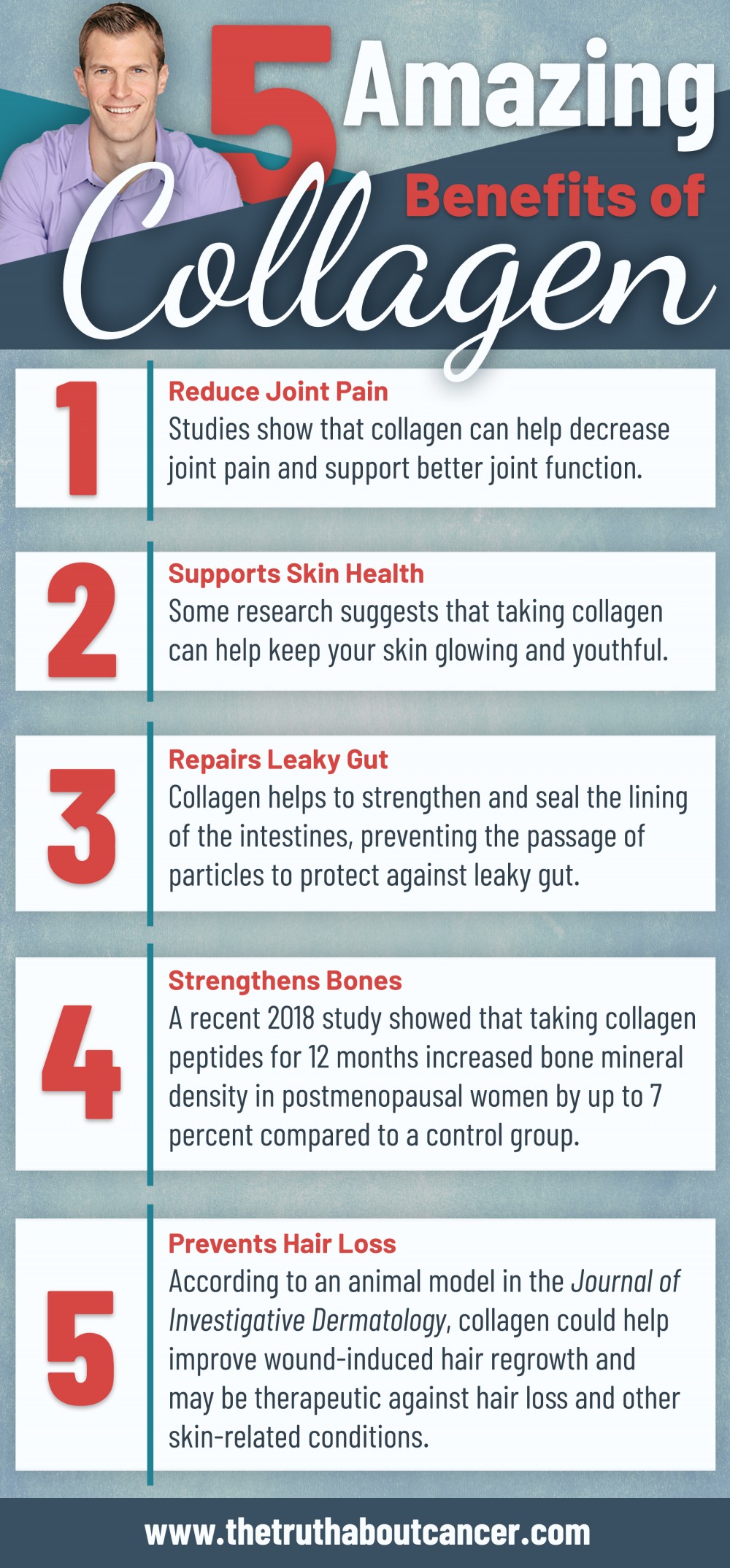Collagen has become one of the most buzzed-about supplements in the health world lately. Widely advertised as a “fountain of youth,” many turn to collagen looking to help erase wrinkles, soothe joint pain, and promote gut healing. However, despite its newfound status as a superstar supplement, most people are unsure exactly what it is, how it works, and how it can impact your health.
Let’s take a closer look at what exactly collagen is, plus why you may want to consider adding it to your daily routine.
What Is Collagen?
As the most abundant protein in the body, collagen is found throughout the muscles, skin, tendons, and ligaments. Collagen is often considered the “glue” that holds the body together, helping your joints move easily, keeping your skin from sagging, and strengthening the lining of the gastrointestinal tract.

Several different types of collagen exist, and every type is made up of a mix of different amino acids, including glycine, arginine, proline, and hydroxyproline – each of which plays an integral role in overall health.
Once you get older, collagen production starts to decline naturally, resulting in increased signs of aging like wrinkles, decreased skin elasticity, cellulite, and joint pain. Other factors may also play a role in reduced collagen levels, including smoking, excess sun exposure, and nutritional deficiencies. Genetics, sleep deprivation, impaired gut health, and high stress levels could contribute as well.
Taking a collagen supplement is an easy and effective way to bump up collagen levels in your body to slow the signs of aging and support overall health. Available in both powder and capsule form, collagen makes a great addition to your anti-aging routine and may help decrease joint pain, support skin health, prevent leaky gut, strengthen bones, and protect against hair loss.
5 Benefits of Collagen
1| Reduces Joint Pain
Pain, swelling, and stiffness of the joints are a few of the most common symptoms that tend to pop up as you get older. Arthritis, in particular, is a condition characterized by inflammation in the joints that affects approximately 23% of all adults in the United States and becomes increasingly prevalent with age.1
Studies show that collagen can help decrease joint pain and support better joint function. According to a study in the journal Complementary Therapies in Medicine, for example, supplementing with 1,200 milligrams of collagen hydrolysate for six months was effective at decreasing joint pain compared to a placebo. Another study out of Pennsylvania showed that using collagen decreased activity-related joint pain in athletes over a six-month period.2
2| Supports Skin Health
Some of the most noticeable signs of decreased collagen production can be seen right on your skin. In fact, changes in skin hydration, skin texture, and appearance are a few of the standard symptoms of aging often experienced by those with decreased collagen levels.
Some research suggests that taking collagen can help keep your skin glowing and youthful. A 2014 study conducted by the University of Kiel reported that supplementing with collagen peptides for eight weeks improved skin elasticity and skin moisture in older women.3 Although more research is needed, it’s also thought that collagen could be therapeutic for other skin issues as well, including cellulite and stretch marks.
3| Repairs Leaky Gut
Leaky gut syndrome is a condition in which food particles and toxins are able to pass through the digestive tract into the bloodstream, causing widespread inflammation throughout the body. Leaky gut syndrome can also cause symptoms such as bloating, fatigue, headaches, skin problems, and weight gain.
Collagen helps to strengthen and seal the lining of the intestines, preventing the passage of particles to protect against leaky gut. Not only that, but other research suggests that there may be a link between collagen and other inflammatory issues as well. For example, some studies have found that collagen levels are actually decreased in those with inflammatory bowel disease, a condition that causes inflammation in the digestive tract.4
4| Strengthens Bones
Bone loss is a serious issue that occurs with age, increasing the risk of fractures and upping the chance of developing conditions like osteoporosis. As a major component of the bones, collagen can help promote bone density and build up bone strength.
For example, a recent 2018 study in Nutrients showed that taking collagen peptides for 12 months increased bone mineral density in postmenopausal women by up to 7 percent compared to a control group.5 In another study, combining collagen with calcium decreased levels of several specific proteins in the body responsible for bone breakdown to a greater extent than calcium supplements alone.6
5| Prevents Hair Loss
Collagen is considered the building block of the hair, skin and nails, so it should come as no surprise that it could potentially help promote hair growth and prevent hair loss. According to an animal model in the Journal of Investigative Dermatology, collagen could help improve wound-induced hair regrowth and may be therapeutic against hair loss and other skin-related conditions.7
Read Next: 5 Collagen-Inspired Recipes for Graceful Aging
Editor’s Note: This article was initially published in 2019 and has been updated in 2024.




















What is the best collagen supplement for someone on a plant based keto diet? I’m 65, and healthy, working on slowing down and reversing the aging process! Thank you for your help with this.
Catherine Lewis
Hi Catherine –
Thanks for your comment.
At this time we don’t know of any plant-based collagen supplements but perhaps you can search online for a local store or online store which sells this.
Blessings and love!
I have a pressure cooker. How can I use that to make bone broth?
Hi Gina –
You can add the bones of any organic meat of your choice and leave that in your pot on low for a few hours. Here’s more info on this: https://thetruthaboutcancer.com/bone-broth-nutrition/
Happy learning!
Thank you for your article. As a vegetarian, it’s been a bit more challenging to find suitable collagen supplements. Any recommendations?
Hi Deena –
Thanks for asking. I’m sorry, but at this time we don’t have any vegetarian collagen supplement recommendations. It would be best if you were to search online for a USDA certified organic collagen supplement which you can buy at a local store (or in an online store).
Blessings and love!
Totally agree. I’m pretty much vegan apart from eggs and so unless another form becomes available I also won’t use it.
There are so many supplements on the market, how do we know which is a reputable product?
Hi Kathy –
Great question. It’s always best to do research on the company’s ethics, research on their products, make sure their ingredients are USDA certified organic, and be sure to read the reviews on multiple websites.
Hope this helps! Blessings and love!
I trust only Mercia supplements and Mike Adams of naturalness.com for safe and tested supplements.
I am a firm believer of what Dr Axe said. I’ve seen and noticed all the physical and health benefits with my own body, once I have started talking Dr Axe’s collagen products. I prefer them in powder form.
Why do you prefer them in a powder type? What can be the difference if I may ask? Thanks
cancerous foods should be avoided in order to reduce the chances of cancer infections.always keep in mind that life is precious.
Very true!
Well Written. Learned some new stuff with very detailed information.
Wonderful to hear, Mark! Thank you so much for sharing your thoughts on this with us. 🙂
Make certain any beef collagen is tested 3rd party for bovine encephalitis . Neocell does this. Oddly you can find Collagen supplements in the beauty section of your local health store. Neocell also includes in the formula a clean and high percentage of Hyloronic acid, Vitamin C , ALA,, grass-fed, non GMO, gluten free and Paleo friendly. I use it daily..makes a great difference as I have connective tissue disease..Lupus related. Whicj means my body destroys my own Collagen. Also for those that are vegans..you have to understand that Collagen is animal tissue. If you can’t consume then you have to synthesize your own. Working out breaks down your muscles and forces the fibro blasts to create new Collagen in your own body..we should do both but not always easy. Thete ate other options. Just in my opinion
Gina from Az
This is excellent information, thank you for sharing. I have been doing some research regarding collagen supplements and cancer. It would be great to get an article on that, since reports are contradictory, there are about 20 different types of collagen, and it seems that eating collagen supplements doesn’t equate having more collagen in our bodies, as much is changed during digestion.
What factors influence uptake and utilization of dietary collagen? How much of a good collagen supplement will be absorbed and used by the body? At what rate is collagen lost as we age?
It would be such a blessing if Charlene would put all her best and favorite cancer preventing recipes in a wonderful cookbook! I have been waiting for her cookbook!
I’m doing all I can to heal cancer naturally. I was recently told that collagen supplementation was not a good idea. Something about the collagen encasing the tumor and making my efforts useless. I asked for more details and info on this but didn’t get any. What are your thoughts? I was taking collagen but stopped due to this possibility.
I’m in desperate need of collagen for its benefits and have tried several kinds. But they make me nauseous. What could be the reasons for this? What can I do about it? I don’t eat meat or fish.
Great article…thank you!